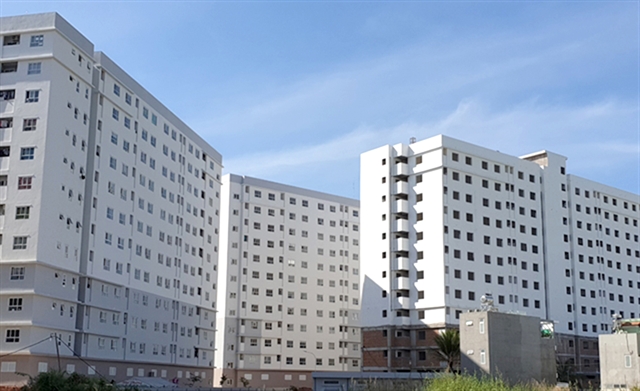HCM City plans to use vacant land plots in industrial parks and export processing zones to build affordable accommodations for workers.

HCM City plans to use vacant land plots in industrial parks and export processing zones to build affordable accommodations for workers, Huynh Thanh Khiet, deputy director of the city’s Department of Construction, has said.
The strategy aims to promote the city’s social housing development programmes and increase the supply of housing for workers.
An overall policy is needed to help workers gain easier access to buying social houses, Khiet said.
The city has 22 industrial parks and export processing zones, and Sai Gon High-Tech Park and Quang Trung Software Park, with around 420,000 workers.
However, the city only built about 15,000 social housing apartments in the 2016-20 period.
According to a recent survey conducted by the department, workers use 15-20 per cent of their average monthly incomes, equivalent to VND1.5-2million (US$65-87), to pay rent for housing.
It takes a long time for workers to be able to afford housing, so many investors are not interested in this kind of housing due to the prolonged capital recovery.
According to deputy chairman of the municipal Labour Federation Pham Chi Tam about 90 per cent of migrant workers live in boarding houses built by local residents.
“Landlords of the boarding houses play a pivotal role in providing accommodations for workers,” he said.
Support policies are needed to help the landlords access bank loans with preferential interest rates to renovate rooms, or build new rooms for rent at reasonable prices, he said.
The city in 2011 launched a preferential credit programme for households and individuals to get bank loans to build or repair their boarding houses for workers to rent.
However, only a few landlords have taken part because it is difficult to meet the requirements to get the loans.
The city needs to diversify capital sources at preferential interest rates and simplify procedures to help landlords easily access loans.
Tran Hoang Ngan, director of the HCM City Development Research Institute, said the instalment payment period for social housing has been increased to 25 years, while the monthly instalment is less than the amount in the past 10-15 years.
However, workers must have a savings of VND200-300 million (US$8,755-13,135) to be able to buy a house in the city.
With an average monthly income of VND8-10 million ($350-435), most workers can only ensure their minimum living standards in the city, so “it is difficult for them to accumulate money,” Ngan said.
The city needs to spend part of the public investment capital to help businesses restore activities, and build dormitories and accommodation areas for their workers to keep them in the city, he said.
Le Huu Nghia, general director of Le Thanh Construction and Trading Company, said his company provided about 7,000 housing units for low-income people.
“The barrier in developing social housing is procedural obstacles,” he said.
Commercial housing projects take 4-5 years to complete legal documents, while the procedure for social housing will take more time and is more difficult.
“The city needs to provide more preferential policies and mechanisms, especially shortening the time for procedures, to attract investors to social housing projects,” Nghia said.
Khiet of the construction department said buyers of social housing apartments are offered preferential loans from the Viet Nam Bank for Social Policies with an interest rate of 4.8 per cent per annum.
The city will have a plan to support developers of housing projects for low-income people.
In the next step, the city will review all available state-owned land fund to change land use purposes for social housing development.
“Improving and simplifying administrative procedures will be a key priority to encourage businesses to invest in this type of housing,” he said.
According to statistics from the construction department, the city now has more than 99,000 apartment buildings for rent with more than 723,000 rooms that provide accommodation for nearly 1.7 million tenants, including around 886,000 workers.
The city targets building one million units of affordable housing in order to meet demand, and will replace old apartment buildings, houses on or along canals, and small boarding houses.
It is also considering building new 5-10 storey apartment buildings.
Rising demand
Besides HCM City, the two southern provinces of Dong Nai and Binh Duong are also in need of more social housing projects to meet the rising demand of low-income people.
Dong Nai Province has around 600,000 workers coming from other provinces and cities across the country. Among them, a large number of low-income earners want to purchase or lease low-cost social housing.
But only around 3,700 social housing units have been completed in the province, along with 13 ongoing social housing projects with 10,746 units totalling 59 hectares.
According to Dong Nai Province’s Construction Department, the province needs 820ha to develop social housing projects, including 309ha for workers and the rest for other low-income people.
Developers of social housing projects will be given priority for loans from the provincial Housing Development Investment Fund.
The province will focus on simplifying procedures and shortening the processing time of the dossiers.
It will create favourable conditions for local households and individuals who are owners of rented rooms to invest in high-rise buildings to increase the number of rooms.
It will help speed up social housing projects in areas with great demand such as Bien Hoa City and districts of Long Thanh, Nhon Trach and Trang Bom.
Industrial, urban and transport infrastructure developer Becamex IDC Corp has put into use more than 7,000 units of social housing for civil servants, public employees, workers, and low-income people in Binh Duong province, with the price ranging from VND100 to 150 million ($4,375-6,570) per 30sq.m apartment.
By 2025, the province will establish new industrial parks, attracting about 450,000 workers.
It plans to develop social housing projects with a total floor area of 2 million square metres to meet rising demand. — VNS





